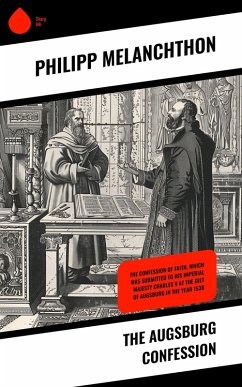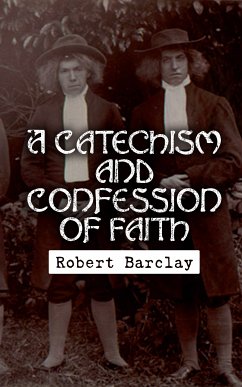
The Augsburg Confession (eBook, ePUB)
Enriched edition. The confession of faith, which was submitted to His Imperial Majesty Charles V at the diet of Augsburg in the year 1530
Kommentar: Lane, Alex / Redaktion: Good Press
Versandkostenfrei!
Sofort per Download lieferbar
1,99 €
inkl. MwSt.
Weitere Ausgaben:

PAYBACK Punkte
0 °P sammeln!
The Augsburg Confession is a seminal text of the Protestant Reformation, presenting a comprehensive statement of Lutheran beliefs articulated with both theological depth and a compelling rhetorical style. Written in 1530, the document outlines key theological positions such as justification by faith and the nature of the sacraments, framed within the broader context of a dialogue with the Roman Catholic Church. Its structured format, composed of twenty-one articles, combines clarity with scholarly precision, aiming to reconcile doctrinal differences and earnestly solicit ecclesiastical peace w...
The Augsburg Confession is a seminal text of the Protestant Reformation, presenting a comprehensive statement of Lutheran beliefs articulated with both theological depth and a compelling rhetorical style. Written in 1530, the document outlines key theological positions such as justification by faith and the nature of the sacraments, framed within the broader context of a dialogue with the Roman Catholic Church. Its structured format, composed of twenty-one articles, combines clarity with scholarly precision, aiming to reconcile doctrinal differences and earnestly solicit ecclesiastical peace while establishing the distinct identity of the Lutheran movement. Philipp Melanchthon, often regarded as the "Preceptor of Germany," played a significant role in the Reformation as a close associate of Martin Luther. His profound knowledge of humanism and classical rhetoric equipped him with the tools necessary to articulate these emerging Protestant ideas compellingly. Melanchthon's commitment to education and theology deeply informed the Confession, reflecting his desire for a reformed church that upheld scriptural authority while engaging in constructive dialogue with its adversaries. For readers interested in the history of Christianity, The Augsburg Confession serves as an essential document that not only defines Lutheran theology but also captures the tumultuous spirit of the Reformation era. Its influence persists, inviting reflection on faith, community, and the complexities of belief. Engaging with this text offers invaluable insights into the foundations of modern Protestant thought. In this enriched edition, we have carefully created added value for your reading experience: - A succinct Introduction situates the work's timeless appeal and themes. - The Synopsis outlines the central plot, highlighting key developments without spoiling critical twists. - A detailed Historical Context immerses you in the era's events and influences that shaped the writing. - An Author Biography reveals milestones in the author's life, illuminating the personal insights behind the text. - A thorough Analysis dissects symbols, motifs, and character arcs to unearth underlying meanings. - Reflection questions prompt you to engage personally with the work's messages, connecting them to modern life. - Hand-picked Memorable Quotes shine a spotlight on moments of literary brilliance. - Interactive footnotes clarify unusual references, historical allusions, and archaic phrases for an effortless, more informed read.
Dieser Download kann aus rechtlichen Gründen nur mit Rechnungsadresse in A, B, BG, CY, CZ, D, DK, EW, E, FIN, F, GR, H, IRL, I, LT, L, LR, M, NL, PL, P, R, S, SLO, SK ausgeliefert werden.













